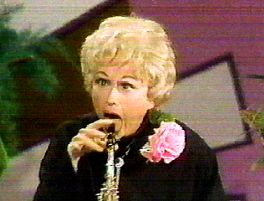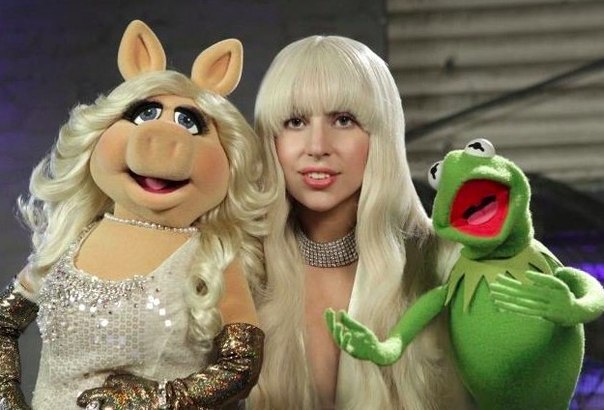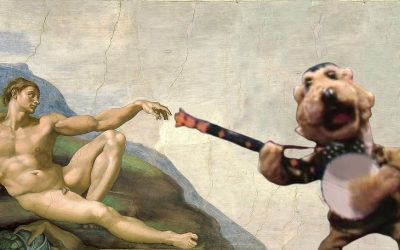 I swear I don’t plan these things. They just happen.
I swear I don’t plan these things. They just happen.
We’re four minutes into today’s episode. The jug band has done the opening number. Statler and Waldorf do a joke. Then we go backstage, where Scooter is congratulating the jug band on a great number.
Hilda the wardrobe lady turns to Scooter and says, “Ohhh… that Miss Diller, she is so wonderful!” Oh, Scooter says. Nice lady, huh? “Ohhh, YES, Scooter,” Hilda gushes, “and so YOUNG-looking!”
Thank you, ladies and gentlemen! Have a good night.
 Oh, all right, I’ll write some more. But I don’t really have to, do I? That just speaks for itself. Yesterday, the 30-year-old Mr Ben Vereen was a young man. On Monday, the 41-year-old Mr Avery Schreiber was a young man. And today, right off the hump, Phyllis Diller, who was 59 years old in 1976, is so YOUNG-looking.
Oh, all right, I’ll write some more. But I don’t really have to, do I? That just speaks for itself. Yesterday, the 30-year-old Mr Ben Vereen was a young man. On Monday, the 41-year-old Mr Avery Schreiber was a young man. And today, right off the hump, Phyllis Diller, who was 59 years old in 1976, is so YOUNG-looking.
And then get this. Hilda asks if Miss Diller has had her face lifted, and Scooter says she jokes about it all the time. “Ah, that’s wonderful,” says Hilda. “A person should stay YOUNG and DYNAMIC as long as possible… Maybe I should consider that. After all, I am thirty-five!”
So the question is, as usual: what the hell? Why so much emphasis lately on how old people are?
 The whole backstage story today revolves around Hilda’s failed attempts to look younger. She tries on a long red wig, then a short blonde wig, each time thinking that no one will recognize the new and improved Hilda. Naturally, each time nobody notices she’s changed anything.
The whole backstage story today revolves around Hilda’s failed attempts to look younger. She tries on a long red wig, then a short blonde wig, each time thinking that no one will recognize the new and improved Hilda. Naturally, each time nobody notices she’s changed anything.
And that’s not all. Right after that first Hilda spot, there’s a comedy sketch with Phyllis and Rowlf trading one-liners on how depressing their lives are. Rowlf’s jokes are mostly about being a dog — “The first three months of my life there was a newspaper strike” — and Phyllis’ are mostly about being old and ugly.
“I went to the beauty parlor, and the lady at the desk said, madam, we do repairs, not reclamations… So then I asked the haidresser what I should use on my hair. He said, a match… But, you see, I was born ugly! I have home movies of my folks leaving the hospital with sacks over their heads.”
 It goes on and on. Next is a Statler and Waldorf gag talking about the guest star: What’s her secret? What’s her magic? What’s her NAME? “You’ve forgotten too, huh?” Waldorf says, and then leans against the balcony railing for a nap. Then it’s back to Hilda in a wig.
It goes on and on. Next is a Statler and Waldorf gag talking about the guest star: What’s her secret? What’s her magic? What’s her NAME? “You’ve forgotten too, huh?” Waldorf says, and then leans against the balcony railing for a nap. Then it’s back to Hilda in a wig.
There’s all this age stuff going on today. We even see Statler and Waldorf dancing in the ballroom sketch.
So this episode is another attempt to figure out an important question: How do you make a puppet show for — and about — adults? That’s the crucial question of the entire first season, obviously, and it occurs to me that one of the ways they tried to establish an adult tone was to populate the show with senior citizens.
It’s weird, when you think about it. At the start of the first season, there’s five major characters who are all elderly — George the janitor, Hilda, Mildred, Statler and Waldorf. (There’s also Bunsen Honeydew and the Swedish Chef, and they’re not spring chickens either.)
 Compare that to the number of child characters: Zero. (Unless you count the teen-something Scooter.) Robin the Frog, the only major little-kid character on the show, hasn’t appeared yet. On the whole, the first season cast skews older than practically any other TV show I can think of. The only other ensemble show that I can think of that includes five elderly main characters is The Golden Girls.
Compare that to the number of child characters: Zero. (Unless you count the teen-something Scooter.) Robin the Frog, the only major little-kid character on the show, hasn’t appeared yet. On the whole, the first season cast skews older than practically any other TV show I can think of. The only other ensemble show that I can think of that includes five elderly main characters is The Golden Girls.
It’s almost like they’re overcompensating, to prove that they’re not making a preschool show. This isn’t Sesame Street, it’s Social Security Street.
But by this point in the season, they’ve pretty much established themselves as an adult show, and this episode — the only episode with a major role for Hilda — marks the point where they really start phasing out the elderly characters. George and Mildred have almost completely disappeared from the series; they pop up in “At the Dance” sketches, but so do various no-name pigs and monsters. By the beginning of next season, which is only six episodes away, the only elderly characters left will be Statler and Waldorf, who are mostly stuck in their theater box. A few years later, they’ll introduce Pops the stage doorman… who’s also stuck in a little box.
 At the end of the episode, Hilda takes one last stab at youth and beauty. Kermit notices how slim she looks in her red dress, and she explains that she’s using very tight foundation garments.
At the end of the episode, Hilda takes one last stab at youth and beauty. Kermit notices how slim she looks in her red dress, and she explains that she’s using very tight foundation garments.
As Kermit admires her, the dress explodes in a shower of dust and torn cloth. “Oh, darn,” she says, “my girdle had a blowout.”
Kermit is reassuring. “Oh, that’s okay, Hilda,” he says. “We love you like you are anyhow.”
Which is very sweet. Except in six episodes, she’s gonna get shipped off to the Old Muppets Home with George and Mildred. So it’s kind of a mixed message, really.
by Danny Horn



